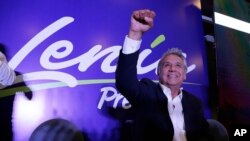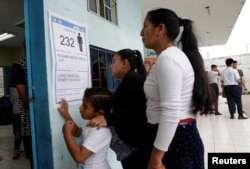The hand-picked candidate of socialist President Rafael Correa took the lead in early results from Ecuador's presidential election Sunday, and was just under the threshold needed to win outright and avoid a runoff against his nearest rival.
With more than 24 percent of polling stations reporting, ruling party candidate Lenin Moreno had nearly 38 percent of the votes, compared to 31 percent for former banker Guillermo Lasso, the closest contender among seven opposition candidates. Exit polls had indicated a tight race, with one predicting the two would have to face off in an April runoff and another pointing to a close first-round victory for Moreno.
To avoid a runoff, Moreno needed to win a majority of the votes, or get 40 percent while holding a 10-point lead over his nearest rival.
Moreno was quick to declare himself the virtual winner when the exit polls were published, while Lasso said the surveys indicated a second round of balloting would be needed.
"This revolution nobody can stop," a triumphant Moreno told supporters in Quito. Standing next to Correa, who he thanked profusely, Moreno called on Lasso to recognize defeat.
The opposition candidate showed no sign of throwing in the towel.
"We have 45,000 volunteers who are watching over the count to confirm what we already know: that there will be a runoff in Ecuador," Lasso told cheering supporters in Guayaquil.
Pre-election polls had suggested that no candidate was likely to get enough votes to win the first round. Expected to decide the race were a third of voters who until recently declared themselves undecided amid low-energy campaigning as the charismatic Correa prepares to retire from politics.
The outcome was being watched closely in Latin America, where conservative leaders in Argentina, Brazil and Peru have assumed power in the past 18 months after the end of a commodities boom that boosted leftists like Correa.
Outside the region, much of the interest in the election focused on what the outcome might mean for WikiLeaks founder Julian Assange, who has been staying at the Ecuadorean Embassy in London. Moreno has indicated he would back Assange's continued stay, while Lasso vowed to evict the Australian activist within 30 days of taking office.
The contest put Correa's legacy on the line as well. The self-declared 21st century socialist who took office in 2007 ushered in a period of stability after a severe economic crisis that saw three presidents toppled in protests and the adoption of the U.S. dollar to control rampant inflation. While Correa has been praised for reducing inequality and overhauling Ecuador's infrastructure, opinion polls said a majority of Ecuadoreans favor change.
Formerly flush government budgets have been slashed and thousands of people at state-run companies laid off as oil revenues in the OPEC nation declined. The International Monetary Fund expects Ecuador's economy to shrink 2.7 percent this year, and analysts predict the new president will have to seek a bailout from the Washington-based IMF to address financial problems made worse by last year's 7.8 magnitude earthquake.
Moreno urged voters to uphold Correa's "Citizens' Revolution," while his challengers vowed to eliminate taxes they contend hamper growth and to strengthen democratic institutions they say were weakened by Correa's leadership.
Also seeking the presidency was Cynthia Viteri, a conservative ex-congresswoman, and Paco Moncayo, the former mayor of the capital, Quito.
In the final weeks before the election, corruption allegations involving Moreno's running mate, current Vice President Jorge Glas, dominated airwaves. A leaked video widely shared on social media shows a disgraced former Cabinet minister undergoing a lie detector test and accusing Glas of taking some of the $12 million in bribes paid to state-run PetroEcuador for construction of a refinery.
Glas denied any wrongdoing.
"We've shown that by campaigning honorably you can win elections," Moreno told supporters after the exit polls were released. "We've had to endure terrible attacks that can't be justified just because of the heat of an election."





